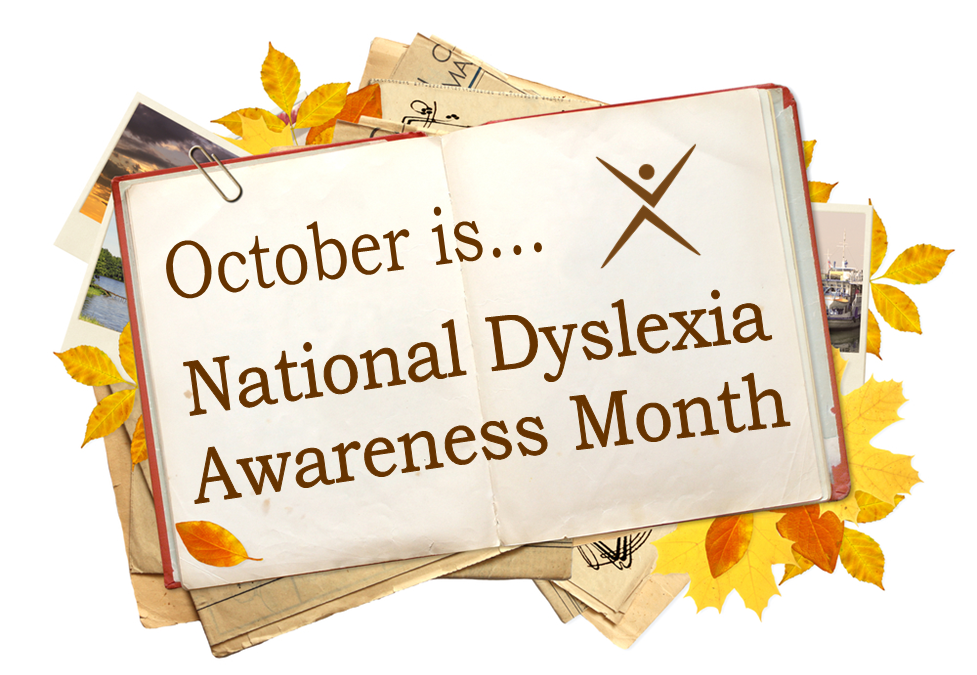
October is Dyslexia Awareness Month
This October is National Dyslexia Awareness Month, and PRIDE Learning Centers is helping to spread the word!
Did you know that Dyslexia is estimated to affect some 20-30 percent of our population? This means that more than 2 million school-age children in the United States are dyslexic! We are here to help.
What is Dyslexia?
Although children with dyslexia typically have average to above average intelligence, their dyslexia creates problems not only with reading, writing and spelling but also with speaking, thinking and listening. Often these academic problems can lead to emotional and self-esteem issues throughout their lives. Low self-esteem can lead to poor grades and under achievement. Dyslexic students are often considered lazy, rebellious or unmotivated. These misconceptions cause rejection, isolation, feelings of inferiority, and discouragement.
The central difficulty for dyslexic students is poor phonemic awareness. Phonemic awareness is the ability to appreciate that spoken language is made up of sound segments (phonemes). In other words, a dyslexic student’s brain has trouble breaking a word down into its individual sounds and manipulating these sounds. For example, in a word with three sounds, a dyslexic might only perceive one or two.
Most researchers and teachers agree that developing phonemic awareness is the first step in learning to read. It cannot be skipped. When children begin to learn to read, they first must come to recognize that the word on the page has the same sound structure as the spoken word it represents. However, because dyslexics have difficulty recognizing the internal sound structure of the spoken word to begin with, it is very difficult for them to convert the letters of the alphabet into a phonetic code (decoding).
Although dyslexia can impair spelling and decoding abilities, it also seems to be associated with many strengths and talents. People with dyslexia often have significant strengths in areas controlled by the right side of the brain. These include artistic, athletic and mechanical gifts. Individuals with dyslexia tend to be very bright and creative thinkers. They have a knack for thinking, “outside-the-box.” Many dyslexics have strong 3-D visualization ability, musical talent, creative problem solving skills and intuitive people skills. Many are gifted in math, science, fine arts, journalism, and other creative fields.
Symptoms of Dyslexia
Preschoolers
- Late talking, compared to other children
- Pronunciation problems, reversal of sounds in words (such as ‘aminal’ for ‘animal’ or ‘gabrage’ for ‘garbage’)
- Slow vocabulary growth, often unable to find the right word (takes a while to get the words out)
- Difficulty rhyming words
- Trouble learning numbers, the alphabet, days of the week
- Poor ability to follow directions or routines
- Does not understand what you say until you repeat it a few times
- Enjoys being read to but shows no interest in words or letters
- Has weak fine motor skills (in activities such as drawing, tying laces, cutting, and threading)
- Unstable pencil grip
- Slow to learn new skills, relies heavily on memorization
School Age Children
- Has good memory skills
- Has not shown a dominant handedness
- Seems extremely intelligent but weak in reading
- Reads a word on one page but doesn’t recognize it on the next page or the next day
- Confuses look alike letters like b and d, b and p, n and u, or m and w.
- Substitutes a word while reading that means the same thing but doesn’t look at all similar, like “trip” for “journey” or “mom” for “mother.”
- When reading leaves out or adds small words like “an, a, from, the, to, were, are and of.”
- Reading comprehension is poor because the child spends so much energy trying to figure out words.
- Might have problems tracking the words on the lines, or following them across the pages.
- Avoids reading as much as possible
- Writes illegibly
- Writes everything as one continuous sentence
- Does not understand the difference between a sentence and a fragment of a sentence
- Misspells many words
- Uses odd spacing between words. Might ignore margins completely and pack sentences together on the page instead of spreading them out
- Does not notice spelling errors
- Is easily distracted or has a short attention span
- Is disorganized
- Has difficulties making sense of instructions
- Fails to finish work on time
- Appears lazy, unmotivated, or frustrated
Teenagers
- Avoids reading and writing
- Guesses at words and skips small words
- Has difficulties with reading comprehension
- Does not do homework
- Might say that they are “dumb” or “couldn’t care less”
- Is humiliated
- Might hide the dyslexia by being defiant or using self-abusive behavior
Adults
- Avoids reading and writing
- Types letters in the wrong order
- Has difficulties filling out forms
- Mixes up numbers and dates
- Has low self-esteem
- Might be a high school dropout
- Holds a job below their potential and changes jobs frequently
Treatment
The sooner a child with dyslexia is given proper instruction, particularly in the very early grades, the more likely it is that they will have fewer or milder difficulties later in life.
Older students or adults with dyslexia will need intensive tutoring in reading, writing and spelling using an Orton-Gillingham program. During this training, students will overcome many reading difficulties and learn strategies that will last a lifetime. Treatment will only “stick” if it is incorporated intensively and consistently over time.
Students who have severe dyslexia may need very intensive specialized tutoring to catch up and stay up with the rest of their class. This specialized tutoring helps dyslexic students become successful in reading, writing, spelling, grammar, and vocabulary. It also will help them with math, and word problems. Fortunately, with the proper assistance and help, most students with dyslexia are able to learn to read and develop strategies to become successful readers.
Karina Richland, M.A., developed the PRIDE Reading Program, an Orton-Gillingham program for struggling readers, based on her extensive experience working with children with learning differences over the past 30 years. She has been a teacher, educational consultant and the Executive Director of PRIDE Learning Centers in California. Please feel free to email her with any questions at info@pridelearningcenter.com.

